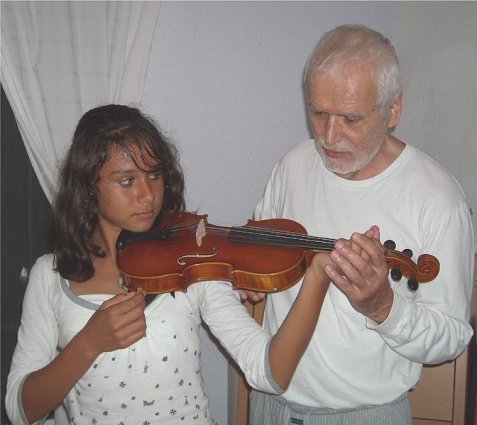
(click for credit)
My parents thought it was very important for all their children to have piano lessons. I think they believed it would give us boys (I have no sisters) some culture, so in first grade we all began learning how to play the piano. My brothers quit as soon as they were allowed, but I really enjoyed those lessons, so I continued. At one time, I honestly thought I would become a concert pianist, but unfortunately, my fingers are too stubby. I simply cannot play many pieces of music properly, because I cannot spread my fingers wide enough to span more than an octave. I still play for church (mostly on the synthesizer), and anyone who watches me play can see that I am truly having fun. I thank God that my parents thought those lessons were important, because they ended up providing me with a long-term hobby that has brought me a lot of happiness.
Long after my brothers quit playing the piano, they complained that those piano lessons (as well as the practicing that went along with them) were a big waste of time. They understood that I really got something out of the lessons, but they were convinced they received nothing. However, a recent study indicates that they may be wrong. They might enjoy better hearing now because my parents forced them to take piano lessons when they were young.
It turns out that when you listen to someone else talking, your brain does an incredible job of interpreting the quickly-changing sounds associated with speech. Especially when the person speaking makes a transition between a consonant and a vowel, there is a rapid change in the properties of the sound wave that hits your ears. To be able to recognize such transitions, your brain relies on its ability to link the sounds the ears are receiving to the time at which the sounds were received. This is called neural timing, and as you get older, your brain’s neural timing deteriorates. This is one reason older people have trouble following conversations. They may be hearing just fine, but if their neural timing is off, they can’t understand the words they are hearing.1
Just last year, a group of scientists showed that people who are actively involved in playing a musical instrument are less likely to experience declines in neural timing as they age.2 This caused the researchers to wonder exactly how powerful music is in maintaining good neural timing. As a result, they decided to study whether or not a person has to be actively involved in music to experience its neural timing benefits. They took 44 adults (aged 55-76), some with normal hearing and some with hearing loss, and measured their brain’s neural timing ability, concentrating on the neural timing necessary to understand transitions between consonants and vowels (what they call “CV transitions”).
All of the adults had been given instrumental music lessons at some point in their youth, but the length over which this instruction took place varied from 1 to 14 years. However, they all had stopped playing their instrument long ago. One had stopped playing only 37 years ago, but most had not played for 50 years or more. One subject who had been given 3 years of piano and violin training had stopped playing 61 years ago.
So while all of the adults had been given music lessons on an instrument, they had stopped playing decades ago. Nevertheless, when the researchers measured their neural timing, they found that the longer they had been given instrumental lessons, the better their neural timing was! As the authors state:3
Here, we show a neural enhancement linked to a moderate amount of music training many decades after training has stopped. Importantly, this enhancement was for encoding CV transitions in speech, which are especially vulnerable to the effects of age, yet important for everyday communication.
So if you are asking yourself whether or not your children really need lessons on a musical instrument, consider the results of this study. It may very well be that instrument lessons in their youth will help them follow conversations well into their old age. Now that’s a lasting benefit!
REFERENCES
1. Handbook of Developmental Cognitive Neuroscience, Charles Alexander Nelson and Monica Luciana (ed), Massachusetts Institute of Technology 2001, p. 311
Return to Text
2. Parbery-Clark A, Anderson S, Hittner E, and Kraus N., “Musical experience offsets age-related delays in neural timing,” Neurobiology of Aging, doi:10.1016/j.neurobiolaging.2011.12.015, 2012
Return to Text
3. Travis White-Schwoch, Kali Woodruff Carr, Samira Anderson, Dana L. Strait, and Nina Kraus, “Older Adults Benefit from Music Training Early in Life: Biological Evidence for Long-Term Training-Driven Plasticity,” The Journal of Neuroscience 33(45):17667–17674, 2013
Return to Text

So learning an instrument preserves your hearing?
I guess that’s proof positive that drums are not an instrument.
Lol, Josiah! As a side note, no one in the study was schooled in drums. The instruments were piano, clarinet, violin, trumpet, organ, accordion, French horn, guitar, viola, and trombone.